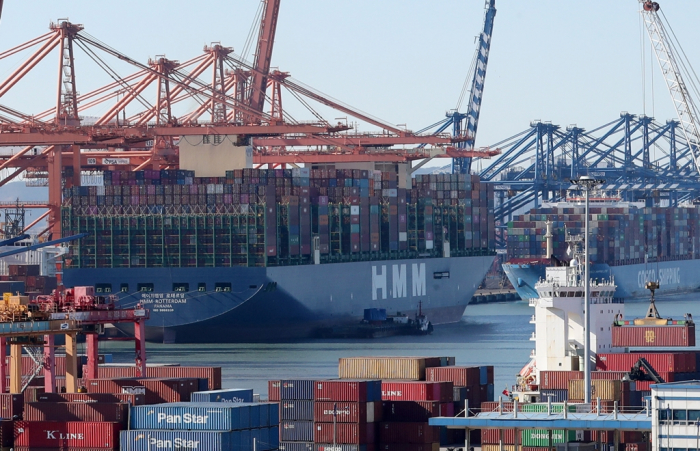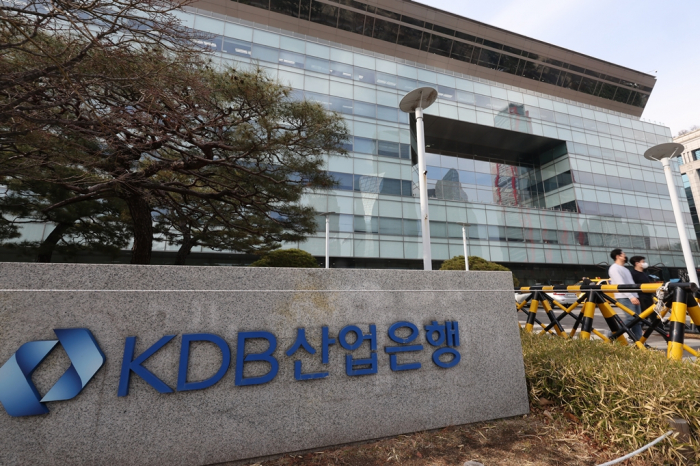Mergers & Acquisitions
KDB reaches out to Hyundai, POSCO, CJ, LX on HMM stake sale
The South Korean authorities need to clear the issue of HMMŌĆÖs perpetual convertible bonds to speed up its privatization
By Nov 22, 2022 (Gmt+09:00)
3
Min read
Most Read
Alibaba eyes 1st investment in Korean e-commerce platform


Blackstone signs over $1 bn deal with MBK for 1st exit in Korea


NPS loses $1.2 bn in local stocks in Q1 on weak battery shares


OCI to invest up to $1.5 bn in MalaysiaŌĆÖs polysilicon plant


Korea's Lotte Insurance put on market for around $1.5 bn



State-run Korea Development Bank (KDB) has contacted major conglomerates including Hyundai Motor Group about the sale of its stake in HMM Co., the countryŌĆÖs largest container line, to recover taxpayersŌĆÖ money injected into the company.
KDB was known to be in touch with the leading South Korean automakerŌĆÖs logistics unit Hyundai Glovis Co., the worldŌĆÖs sixth-largest steelmaker POSCO, CJ and others to sell HMMŌĆÖs management rights, according to the government and industry sources.
With LX Pantos Co., the logistics unit of South KoreaŌĆÖs LX Group, the state bank agreed to look into the feasibility of the stake sale, checking the companyŌĆÖs financial capabilities and other issues.
HMM, formerly known as Hyundai Merchant Marine, was taken over by KDB in 2016 after the company accumulated huge losses amid an industry slowdown. KDB currently owns 20.7% of HMM as its largest shareholder, followed by state-run Korea Ocean Business Corp. (KOBC), which holds a 20% stake.
KOBC plans to hold a stake in HMM on the condition that it will not interfere in its management.
ŌĆ£We plan to sell KOBCŌĆÖs HMM stake in stages but maintain a significant holding,ŌĆØ said an official at the Ministry of Oceans and Fisheries. ŌĆ£We will decide later whether to completely exit from HMM.ŌĆØ
TO RECOVER TAXPAYERSŌĆÖ MONEY ASAP
KDB Chairman Kang Seog-hoon is reportedly seeking to recover taxpayersŌĆÖ money injected into troubled companies as soon as possible. Kang was understood to want to use the proceeds for the state bankŌĆÖs businesses.
In September, KDB sold a controlling stake in Daewoo Shipbuilding & Marine Engineering Co., the worldŌĆÖs second-largest shipbuilder, for 2 trillion won to the countryŌĆÖs leading defense maker Hanwha Group.
KDB was also known to seek the sale before the global container industryŌĆÖs boom burst. The sectorŌĆÖs competition is expected to intensify next year when a slew of new ships are delivered, hurting HMMŌĆÖs profitability.
HMM has been enjoying strong profits after turning to the black in the April-June 2020 period. It had suffered a 21st straight quarterly loss since the second quarter of 2015.
CANDIDATES WITH POTENTIAL SYNERGY
KDB contacted major companies that can create synergy with the acquisition of HMM. Hyundai Glovis could become a comprehensive logistics company if it takes over the container line, for example.
POSCO will be able to carry raw materials for its own steelmaking business. The company had operated a shipping company for five years and sold it to Hanjin. But POSCOŌĆÖs takeover may be restricted as the country requires shippers of large cargoes to get the review of a policy advisory committee before such an acquisition.
CJ Group also has a major logistics unit CJ Logistics Corp. while the group was known to have enough money for HMM.
PERPETUAL CONVERTIBLE BONDS
But industry sources doubted if KDB can smoothly push forward with the sale, given HMMŌĆÖs high corporate value with a market capitalization of 10 trillion won ($7.4 billion).

Its perpetual convertible bonds, which make up some 30% of HMMŌĆÖs stake with a current value of 3.3 trillion won, are another issue. If the bonds are converted into stocks, KDB and KOBCŌĆÖs combined stake in HMM is predicted to jump to 74%.
ŌĆ£It would be key to know how to handle the perpetual bonds,ŌĆØ said an official with direct knowledge of the situation.┬Ā
Related authorities such as the Ministry of Trade, Industry and Energy, the Ministry of Oceans and Fisheries, as well as the Financial Services Commission need to prepare measures to handle the bonds to speed up the sale, industry sources said.
HMM, which has accumulated cash on the recent shipping industry boom, needs to repay the bonds, reducing the financial burden on potential buyers, they added.
ŌĆ£They may allow HMM to buy the perpetual bonds at face value or a small premium to accelerate the privatization,ŌĆØ said one of the sources. ŌĆ£But that could cause a controversy over preferential treatment, so related ministries need to closely coordinate.ŌĆØ
Write to Ji-Hoon Lee and Jung-hwan Hwang at lizi@hankyung.com
Jongwoo Cheon edited this article.
More to Read
-
 MarketsHMMŌĆÖs shares undervalued despite $12.5 billion in cashable assets
MarketsHMMŌĆÖs shares undervalued despite $12.5 billion in cashable assetsNov 11, 2022 (Gmt+09:00)
2 Min read -
 MarketsHMM shares weighed by overhang concerns despite soaring profit
MarketsHMM shares weighed by overhang concerns despite soaring profitMar 24, 2022 (Gmt+09:00)
4 Min read -
 EarningsHMM returns to annual profit in a decade as stake sale looms
EarningsHMM returns to annual profit in a decade as stake sale loomsFeb 14, 2022 (Gmt+09:00)
3 Min read -
 EarningsHMM rakes in record quarterly profits on higher freight rates
EarningsHMM rakes in record quarterly profits on higher freight ratesNov 11, 2021 (Gmt+09:00)
1 Min read -
 Mergers & AcquisitionsKDB seeks to sell $2.3 bn CBs in HMM to lay groundwork for stake sale
Mergers & AcquisitionsKDB seeks to sell $2.3 bn CBs in HMM to lay groundwork for stake saleJul 19, 2021 (Gmt+09:00)
3 Min read
Comment 0
LOG IN


